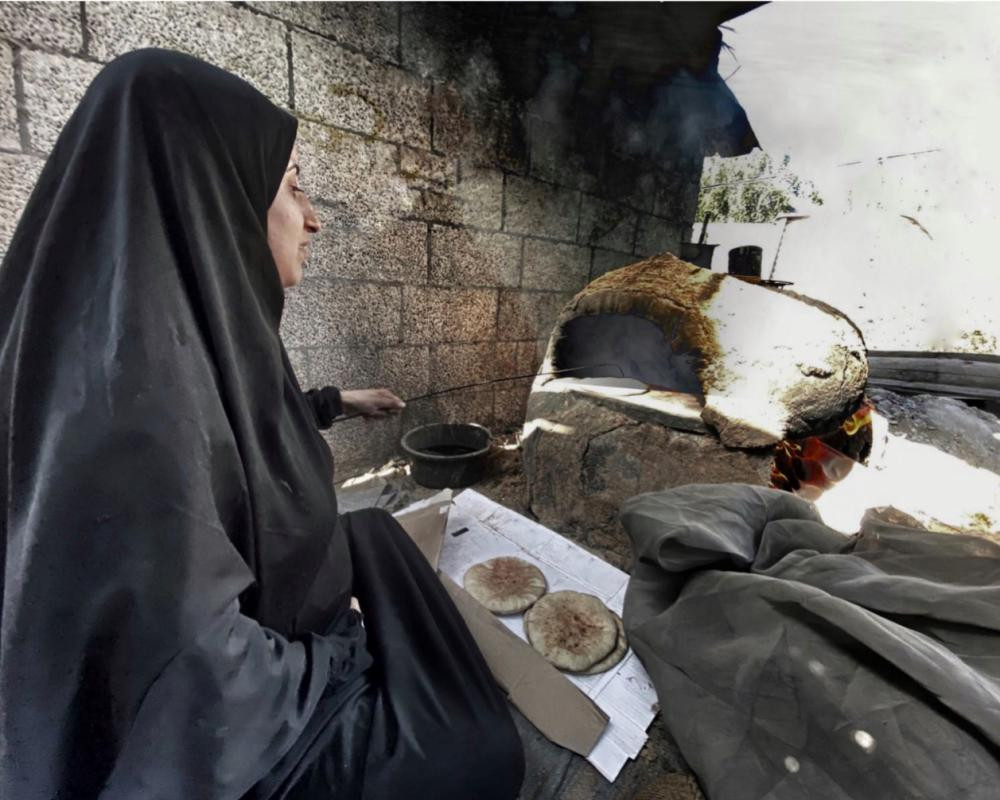Gaza / PNN / By Inam Farwana |
In the makeshift settlement of Al-Masha’ala in Deir al-Balah, 29-year-old Leila al-Qarnawi sits near a clay oven she built with her own hands. Nine months pregnant and displaced from her home, she bakes bread to feed her family in a time of war that has stripped her of nearly everything.
“Since our house in al-Bureij Camp, Block 9, was destroyed, we’ve been living in a tent,” Leila said, exhaustion etched across her face. “We lost everything — our home and my husband’s source of income. I had no choice but to start this small bread-baking project for camp residents to provide for my husband and three children.”
Catching her breath, she continues, “My husband and kids wake up at dawn to collect nylon bags, old pipes, cardboard and worn-out clothes so I can use them as fuel. Firewood has become too expensive. I suffer from shortness of breath, and the thick black smoke from burning these materials suffocates us. With the heat, I often feel I can’t breathe. At night, the coughing keeps me awake for hours in pain and exhaustion.”
Her back aches under the weight of her pregnancy, and her hands are cracked from the heat and labour. Hours spent sitting on the ground baking more than 250 loaves a day turn each day into a physical ordeal. By sunset, she can barely stand.
With fear in her eyes, Leila whispered, “The doctor told me my baby has a lack of oxygen and may suffer from heart problems. His heartbeat is weak, and he weighs only 1.5 kilograms, when he should weigh around three. The doctor warned that after birth, he must see a heart specialist immediately — his condition is due to the smoke I inhale from the oven.”
Her voice breaks as she adds, “The doctor told me not to sit near the fire, that it’s dangerous for both me and the baby. The smoke suffocates me, worsens my chest pain, and could cause complications during birth. But I have no other choice… everything I do is just to keep us alive.”
A Husband Wounded, a Wife at the Oven
A few kilometres away, Asma al-Attar, 27, displaced from Jabalia Camp, stands before her clay oven in a makeshift camp in al-Mawasi, west of Khan Younis. Six months pregnant, she bakes bread with blistered hands to feed her four children and her injured husband.
The flames scorch her face, and the thick black smoke from burning nylon and worn-out clothes chokes her lungs. Yet, she keeps working in silence, burdened by pain. Her swollen feet and aching back do not stop her — hunger does not wait, and the child growing inside her must live amid the ashes.
“After my husband was injured and couldn’t work, I had no choice but to take responsibility,” she said. “I started baking bread using a clay oven to feed my family. Even though I’m pregnant and exhausted, I must continue — there’s no alternative for survival.”
Wiping sweat from her forehead, she continues, “Every day I start at six in the morning, preparing the oven with plastic strips, nylon, and old shoes instead of firewood. A kilo of wood now costs 12 shekels, and I can’t afford it. The black smoke fills the air; we choke on it. Sometimes I feel like I can’t breathe, but I have to keep working.”
She pauses, looking at her swollen feet. “Sitting on the ground for long hours leaves my legs swollen and my back in pain. By the end of the day, I can’t feel them from exhaustion. Still, I wash my hands, cook, and endure it all because I must — for my husband, my children, and myself.”
Doctors Warn of Health Risks
Dr. Maher Saadi Ajjour, a consultant in obstetrics, infertility and reproductive medicine, said that the war has forced many pregnant women into extreme and dangerous conditions — including long hours of exposure to intense heat from clay ovens.
He explained that direct exposure to high temperatures, whether from sunlight or fire, can cause dizziness, fatigue and dehydration in pregnant women. Repeated increases in body temperature, he warned, can harm both mother and baby, especially during the first trimester when vital organs form — raising the risk of developmental complications.
The greater danger, he added, comes from toxic gases released when burning plastic, nylon and old clothing — materials families now rely on for fuel. “These materials release carbon monoxide, a poisonous gas that prevents oxygen from reaching the mother’s and baby’s blood,” he said.
Dr. Ajjour noted that oxygen deprivation leads to chronic fatigue, headaches, and abdominal and back pain, and can result in low birth weight or reduced blood flow to the foetus. “In recent months,” he added, “we have observed cases of foetal abnormalities and growth impairments linked to these harsh conditions.”
He urged pregnant women to avoid inhaling smoke and toxic gases whenever possible and to seek medical attention immediately if they experience unusual symptoms, particularly in early pregnancy.
A Growing Health Crisis
According to Zaher al-Wahidi, Director of the Health Information Unit at Gaza’s Ministry of Health, the situation for pregnant women is alarming. Around 50,000 pregnant women in the Gaza Strip currently face growing risks amid the collapse of healthcare services and the lack of essential maternal care.
Since the start of the year, the ministry has recorded 2,869 miscarriages, while 8.9% of newborns weighed under 2.5 kilograms — figures that point to a worsening maternal and child health crisis.
“These numbers reveal that the suffering of women and children continues even after the bombs stopped falling,” al-Wahidi said. “The echoes of war remain — its impact on their health and lives is far from over.”
Source link
#Gazas #Pregnant #Women #Bear #Scars #War #Bread #Smoke #Survival

